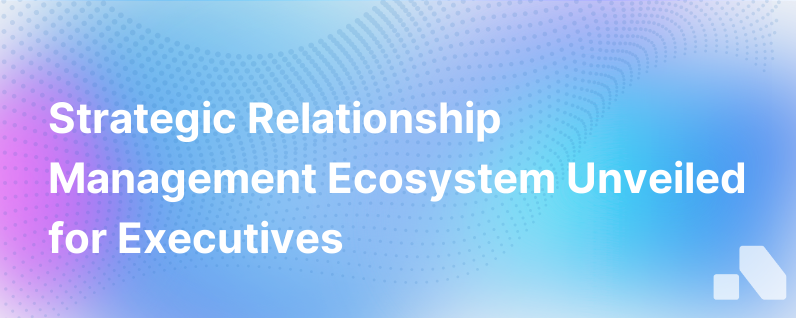Strategic Relationship Management The Ecosystem Explained
Published on September 21, 2023 by David Zhang
Businesses navigating today’s complex and dynamic market landscape realize that fostering strong strategic relationships is more than just a nicety—it's a necessity. Strategic Relationship Management (SRM) is the comprehensive approach organizations employ to systematically manage their interactions with various external entities, such as customers, partners, suppliers, and sometimes even competitors. Crucially, SRM includes not only managing one-on-one relationships but also understanding and nurturing the broader ecosystem in which these relationships operate.
In this article, we’ll unpack the concept of the SRM ecosystem, its constituents, and its potential to generate mutual value through cooperative efforts. We'll also explore effective strategies and touch on how leveraging technological solutions, like Aomni, can significantly enhance SRM efforts.
Understanding the Strategic Relationship Management Ecosystem
The SRM ecosystem comprises all the stakeholders interconnected directly or indirectly with your business operations—they can be vendors, channel partners, industry associates, or any other external ally that contributes to your business growth or operations. Each of these entities interacts not only with your organization but also within a web of relationships influencing each other and your industry.
Why a Systematic Approach to SRM is Paramount
A successful strategic relationship isn’t about short-term gains; it’s about investing in long-term partnerships that create enduring value for all involved. There are several key reasons why adopting a systematic approach to SRM is essential:
-
Maximizes the Value of Partnerships: By managing relationships strategically, organizations can unlock the full potential of their collaborations, often discovering untapped opportunities for growth and innovation.
-
Strengthens Market Position: Effective SRM can create a competitive advantage. It might help in understanding industry trends as well as securing long-term commitments from partners and suppliers, ensuring stability and market presence.
-
Enhances Reputation: A firm seeking a reputation as a reliable, value-adding partner will find SRM essential in establishing and maintaining its standing.
-
Fosters Innovation: Dynamic relationships often lead to the cross-pollination of ideas, prompting innovation that can't be achieved in isolation.
Key Players in the Ecosystem
Customers
The bedrock of any business, their needs and feedback are central to shaping product development and service improvements. An SRM strategy for customers focuses on ensuring customer satisfaction and loyalty, and should seek to predict and proactively meet customer needs, exceeding expectations and nurturing trust.
Suppliers
Reliable suppliers underpin operational efficiency. Through SRM, businesses ensure consistent supply chain operations, manage risks effectively, and co-create value.
Channel Partners
These partners amplify your market reach. Strategic Relationship Management nurtures these partnerships, aligning incentives and ensuring all understand the broader goals.
Competitors
Yes, even competitors fit into the SRM ecosystem—instead of outright rivalry, consider strategic alliances or friendly competition that can push both businesses towards innovation and mutual market growth.
Strategies for Effective SRM
Align on Values and Goals
Aligment in expectations, business ethics, and long-term objectives are crucial in any strategic partnership. Ensuring that you and your ecosystem partners are on the same page reduces the risk of conflict and creates a solid foundation for cooperation.
Prioritize Communication
Clear, open, and consistent communication is vital. Develop formal communication channels and protocols, and make sure that there is understanding at all levels of the relationship.
Personalize Your Approach
While standard processes are essential for efficiency, remember that each relationship within the ecosystem has its own dynamics. Customize your approach to the specifics of the individual entity and the unique nature of each relationship.
Leverage Data and Technology
Harness analytics tools to gain insights into partnership performance. Solutions like Aomni streamline data utilization, providing real-time intelligence that is actionable and relevant.
Build for the Long-Term
Strategic relationships should focus on achieving lasting mutual success rather than quick-returns. Set up mechanisms to regularly review and adapt partnership terms to evolving market conditions and business strategies.
Negotiate for Mutual Benefit
Negotiation within strategic relationships must focus on shared success rather than zero-sum outcomes. This requires understanding and addressing the needs and pain points of both parties effectively.
Invest in Joint Solutions
Working with ecosystem partners to develop joint products or services can not only lead to innovative solutions but also deepen the relationship through shared investment and success.
Harnessing Technology like Aomni
Leading-edge platforms like Aomni help businesses navigate the complexity of SRM ecosystems. Aomni provides the tools needed to conduct real-time account research, attain actionable competitive insights, and create personalized sales content. The platform streamlines the process of relationship management, enabling businesses to understand their relationship web, identify key leverage points, and maintain the freshness and relevance of their partnerships through timely intelligence.
Final Thoughts
Building and nurturing a strategic relationship ecosystem is vital in a world where no company operates in Iisolation. With an intentional and systematic approach to SRM, businesses set themselves up for sustained growth and success. The synthesis of traditional relational strategies and contemporary technology platforms like Aomni empowers organizations to understand and maximize their relationship capital, turning partners into allies and fostering a coalition of success.
Understanding and effectively managing the SRM ecosystem isn't an overnight process—it's an investment in what is essentially the social capital of the business world. However, handled correctly, it's an investment that can yield significant dividends, both tangible and intangible, reinforcing the adage that in the world of business, it's not just what you know—it's who you know and, more importantly, how well you manage those relationships.